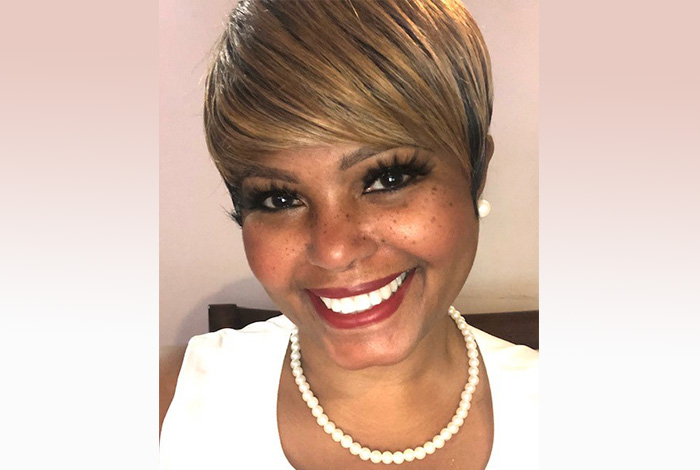Dr. Sheryl Jones Acknowledges Importance of Recognizing Intersectionality
02/16/2022

This Black History Month, Centene is highlighting diverse employees who are making an impact every day and advancing diversity. Dr. Sheryl Jones is Centene Advanced Behavioral Health (CABH) Medical Director with Meridian Health Plan. Board-certified in adult and child and adolescent psychiatry, she works to create policies, practices, and plans that address disparities and lead to improved whole health for our members and communities. Learn more about Dr. Jones and her background, why she values mentorship, and the importance of recognizing and addressing the intersectionality of your colleagues and those you serve.
Q. Tell us about your background and your current role at Centene?
A. I am double board-certified in adult psychiatry and in child and adolescent psychiatry. I am originally from Memphis, Tennessee, where I reside currently. I attended college in Evanston, Illinois, at Northwestern University, and medical school at Meharry Medical College in Nashville, Tennessee. I completed my adult and child and adolescent psychiatry residency training at Emory University in Atlanta, Georgia. After graduation from Emory, I returned home to Memphis, where I’ve engaged in a variety of clinical, community, and civic pursuits. I’m a proud member of Delta Sigma Theta Sorority, Incorporated, and The Links, Incorporated. I also recently completed an Executive Master in Business Administration at the University of Memphis - Fogelman College of Business and Economics.
I’ve worked in various settings, including rural healthcare, community mental healthcare, adult correctional and juvenile detention facilities, hospital outpatient clinics, and private practice. I also worked for United Behavioral Health/Optum for five years as a Corporate Medical Director before joining WellCare two years prior to the acquisition. I’m currently a Centene Advanced Behavioral Health (CABH) Medical Director, working with Meridian Health Plan. I’ve also had the pleasure of serving the Centene community through my involvement with several groups and committees, including Centene’s Multicultural Network MOSAIC Mentorship Committee, the Tampa Chapter of ABILITY, Centene’s Health Equity and Wellness Council, the Behavioral Health Subcommittee for the Centene Vaccine Hesitancy Study, and the CABH Women Physician’s Group. These activities have significantly enhanced my ability to create, to innovate, and to contribute.
Q. What is the most meaningful part of your job?
A. The most meaningful part of my job is being able to positively impact services that members receive by bringing intersectional, social determinants, and cultural perspectives to their care and to internal case reviews. I also really enjoy opportunities to share information and collaborate with utilization managers, psychiatrists, nurse practitioners, and other behavioral health clinicians.
Q. Who influenced you most during your career and why?
A. I would say that I have had three primary influences during my time with WellCare and Centene. I’m a big advocate for mentorship and sponsorship, as all indicators point to these factors as having the greatest impact on career growth and development. During my time with the company, Dr. Gloria Wilder has served as a professional sponsor. Dr. Sander Koyfman served as a mentor. And Dr. Brock Nolan, my current manager, has served as a steadfast advocate for the members of his team, myself included.
Q. How do you feel about Centene's approach to diversity, equity, and inclusion?
A. Centene has talented and dedicated professionals working and leading our Diversity, Equity & Inclusion (DEI) Office and programs. They are committed to the company’s growth and development as a diversity, equity, and inclusion leader. The DEI Office is consistently active in engaging employees and bringing quality training and programming to Centene leaders and associates. The existence and support of such a strong DEI Office speaks to the dedication and commitment of company leadership to make Centene a place where all employees feel appreciated and can live up to their greatest potential.
Q. Can you talk about the importance of intersectionality?
A. We often ask our colleagues to “bring their whole selves to work,” with their unique and multidimensional lived experiences because we know that having a diverse workforce with rich and multifaceted perspectives leads to creativity, innovation, and greater productivity in the workplace. Bringing one’s “whole self” to work means acknowledging and walking boldly in the “intersection” of every aspect of who we are, including gender, race, age, abilities, sexual orientation, and every other social identifier that might be present. Intersectionality is essentially a synonym for “whole self.” It helps us recognize how each individual aspect joins together to create the whole and how each individual has a unique experience of the world (organizations, institutions, policies, laws, etc.) and its inhabitants.
Q. How can we use an intersectional lens to enhance care to our members and the communities we serve?
A. Recognizing and acknowledging the intersectionality of our members and communities affords us the opportunity to create policies, practices, and procedures that address disparities and lead to whole health and transforming the health of the community, one person at a time. Without recognizing and addressing the intersectionality of members and providers, it would be difficult to provide optimal services.
Q. What are your thoughts on the significance of Black History Month?
A. In the words of historian and author Carter G. Woodson, founder of the Association for the study of Negro Life and History (the organization that in 1926 created “Negro History Week,” the precursor to Black History Month), “If a race has no history, it has no worthwhile tradition, it becomes a negligible factor in the thought of the world, and it stands in danger of being exterminated.”
Black History Month allows us to pause, reflect upon, and celebrate the immeasurable contributions of Black people to society and to the world at large. Without this month-long recognition, many of these contributions might never be acknowledged or appreciated.